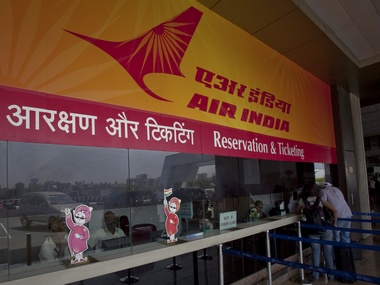A group of public-spirited activists, including National Advisory Council member Aruna Roy, Prashant Bhushan and 11 others, has asked Prime Minister Manmohan Singh to stop the bailout of Kingfisher Airlines using public funds from nationalised banks.
Their main demand is that Vijay Mallya, the flamboyant owner of Kingfisher Airlines, should be eased out of managing the airline, and be forced to “liquidate his own personal assets to pay for the excesses of his airline. Mr Mallya must be forced to bring in at least Rs 4,000 crore to KAIR (Kingfisher Airlines).”
[caption id=“attachment_232195” align=“alignleft” width=“380” caption=“Is the behaviour of Air India less worthy of a note to the PM than Kingfisher? Reuters”]
 [/caption]
[/caption]
This writer agrees with this sentiment, but balks at the suggestion that Mallya must both put in the money and be eased out of the management. That cannot happen - and even if the government forces such action - it can only result in prolonged litigation that will not help the airline or its customers who have been treated with disdain.
Firstpost also notes that several allegations made in the letter would apply not only to Kingfisher, but others, too.
For example, the letter says Mallya “has driven this airline to bankruptcy by sheer mismanagement and bad financial planning.”
We agree. We wrote about it in September 2011, when Kingfisher’s auditors first brought out the sorry state of affairs in the airline (Read here).
However, we would like to point out that Air India, which the government itself runs, is not doing much better. In fact, the charge levelled against Kingfisher would be even truer of Air India. We believe that under Praful Patel as aviation minister, the promoter of the airline - the government - drove the “airline to bankruptcy by sheer mismanagement and bad financial planning.”
Impact Shorts
More ShortsThe letter also complains that “high-spending Kingfisher Airlines has not been transferring PF payments of employees as well as taxes deducted at source, forcing the tax department to freeze its accounts. Staff salaries have also been delayed, as are payments to suppliers.”
But is Air India any different?
If you want to read stories about Air India’s failure to pay taxes, read here . If you want to know about its credit defaults, read here . If you want to listen to pilots complaining about salary delays, click here. And if you want to know whether Air India is paying its bills to oil companies, the answer is here.
Is the behaviour of Air India less worthy of a note to the PM than Kingfisher?
The activists, while correctly railing against a taxpayer-led bailout for Kingfisher, seem to have nothing to say about Air India, on which a decision to bail out has already been taken, including debt restructuring and equity infusions.
The letter-writers claim that “Kingfisher’s profligacy is not only at the cost of India’s nationalised banks but also the national carrier - Air India.”
It is worth pointing out that any bailout comes at the cost of the rest of the industry. If Kingfisher is bailed out, it is essentially being rewarded for failure. When Air India gets an endless lifeline, no one in the industry can raise fares, since Air India can use easy money to keep fares down. Bailing out anyone - especially large bailouts - can make the rest of the industry sick.
The concept of a national carrier is also outdated in this age of competition.
The letter makes no mention of the real remedy for Air India after a bailout: autonomy. Without this, there is not a snowball’s chance in hell that the “national carrier” can ever learn to compete.
Firstpost believes that while the aviation sector needs a broad policy package, Kingfisher must be allowed to die if Mallya can’t bring his own money or rope in a well-funded equity partner. As for Air India, it must be allowed to get a life.
It must be removed from the care of the aviation ministry, asked to find its own money for growth, and given autonomy. The government can choose to retain its share of holdings or sell it.
)